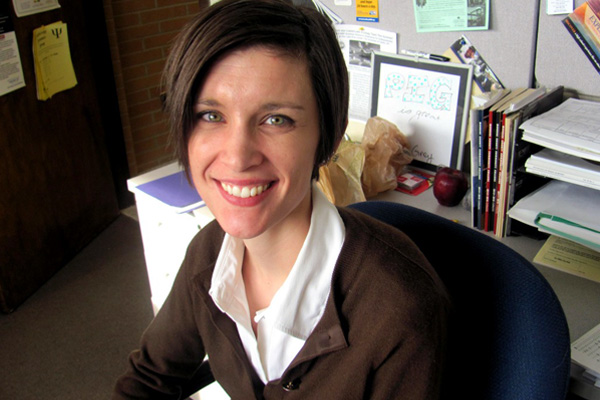UM-Flint Psychology Research on Women, Objectification, and Media

How does the objectification of a woman affect our perception of her? How does it affect our perception of other, non-objectified women? Would it make a professional spokeswoman seem less effective and persuasive? These questions sit at the heart of new research conducted by Dr. Terrence Horgan, Professor of UM-Flint Psychology, and some of his past and current students.
"Sex Doesn't Always Sell: The Effects of Objectifying Images on the Perceived Competence of a Spokeswoman" will be published in an upcoming issue of the American Psychology Association's peer-reviewed academic journal Psychology of Popular Media Culture. The paper captures three years of work between Horgan and his co-authors: Noelle Herzog, Melissa Grey, Tiffany Latreille, and James Lindemulder.
"Objectification means that a person is viewed as less than a person," said Melissa Grey, PhD, '04 alumna of UM-Flint Psychology and Associate Professor at Monroe Community College. "They are seen as an instrument to be used by others or something for others' pleasure."
The Research
According to the finished research, "In everyday life, women see women being depicted as sex objects in the media. This study suggests that this exposure has the potential of leading women to subsequently see less effectiveness and persuasiveness in a spokeswoman they are evaluating in a professional context."
The group's work built on existing objectification theory while exploring new ideas and addressing limitations in previous research. Their study asked participants to examine magazine ads, group the images into categories, and then to listen and watch a speech on cycling (an intentionally non-sexualized topic) and answer questions. Participants were told the two parts were unrelated experiments, and portions of their work related to other research, so the true nature of their tasks was not perceived.
In the first portion of the experiment, participants either reviewed body-objectifying images or control (non-objectifying) images. During the second portion, participants saw two versions of the same woman giving a speech: one version with a lean build, the other with a heavier build. It was the same woman and speech, but her body was digitally altered to appear at different ends of the typical BMI range.
When asked about his interest in this area of research, Dr. Horgan replied, "The learning process within a research setting can be bidirectional in nature: students learn from their teachers, and teachers learn from their students. Dr. Grey was once an undergraduate student in the UM-Flint Psychology Department. Her thesis dealt with objectification theory. She helped me understand the theory and the implications of objectification processes to our society in general and to women in particular. The former UM-Flint student became my teacher. I now teach what I have learned from her to my students."

The Results
The results of the experiment were consistent: "Those who spent a few minutes looking over the objectifying pictures rated the spokeswoman as less effective and persuasive," said Dr. Grey. "This is really important because our spokeswoman had nothing to do with the pictures. It seems that those objectifying ideas keep objectification active in participants' minds and then spill over onto views of other people."
Dr. Grey also noted her surprise that the changed physical appearance of the spokeswoman did not affect the viewers' perception. "I expected these two versions to be rated differently," she said, "but there was no difference at all. More research is needed to understand this better. For now, though, it struck me that maybe anyone—those women who come pretty close to meeting the mainstream beauty ideal and those who don't—could be affected by objectifying images surrounding them or surrounding those with whom we interact."
Noelle Herzog, a 2015 graduate from UM-Flint Psychology, was involved in the research and publication both as an undergraduate and alumna. "It is important for women to understand the power the media has on our self perception and our perception of others in order to overcome such adverse effects," she said. "This is what interested me in participating in this research study. The findings have inspired me to become more aware of the devaluation women are faced with in everyday media."
The Impact of Research in UM-Flint Psychology
UM-Flint is known for providing its undergraduates opportunities to conduct hands-on research with their faculty members. Publishing and presenting papers is often a part of the shared experience. As noted above, both faculty and students benefit from working together.
"I am honored to have had the opportunity to work with Dr. Terrence Horgan and Dr. Melissa Grey," said Herzog. "Dr. Horgan has inspired me to become a future scholar through his tireless passion for the research he conducts. I am thankful for the publication and hope this will aid in my pursuit of graduate school."
Since graduating in 2015, Herzog has been a research coordinator at the University of Michigan Hospital and is now the Lead Clinical Subjects Coordinator. She hopes to continue into a graduate program to pursue education in Social Psychology.
"My research assistants at UM-Flint have always been important to my success as a researcher," noted Dr. Horgan. "They have a strong desire to search for answers to research questions. They provide unique insights into possible avenues of exploration. And the energy they bring to the lab is truly remarkable. All this fuels my commitment to conduct quality research here at UM-Flint."
Related Posts
No related photos.
UM-Flint News
The Office of Marketing & Communications can be reached at mac-flint@umich.edu.